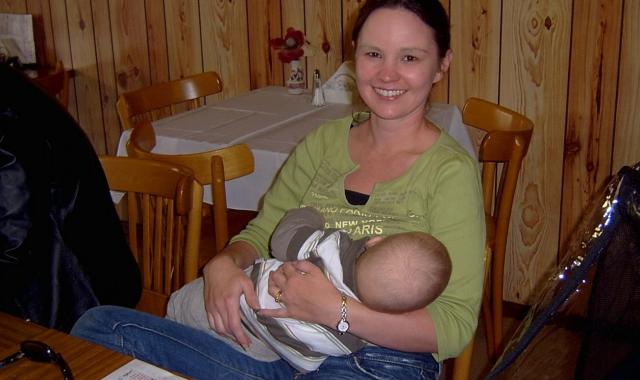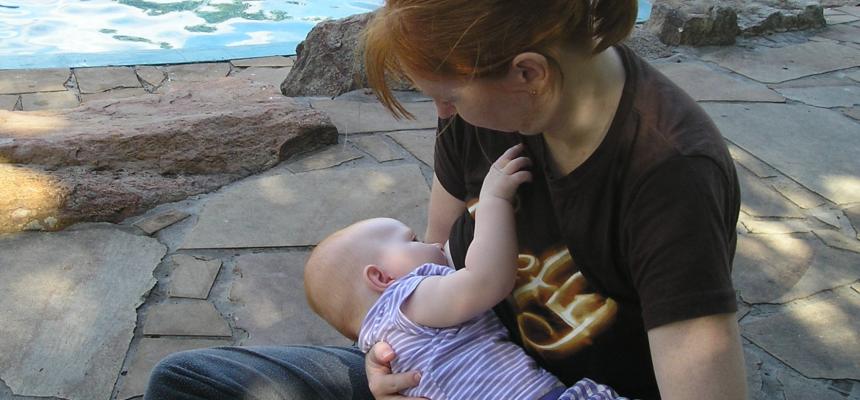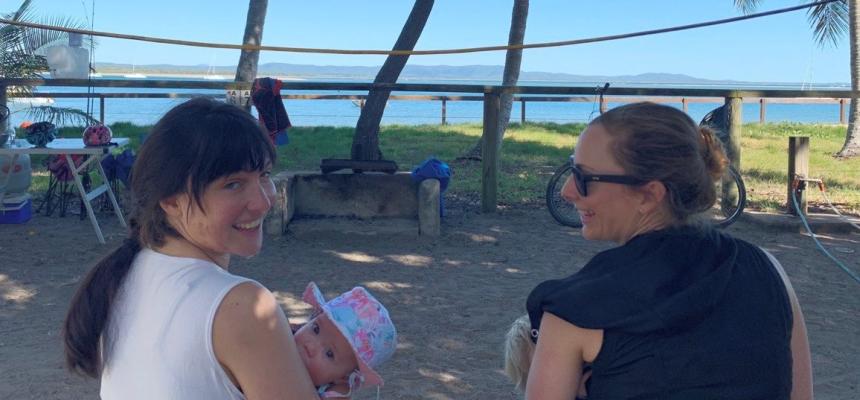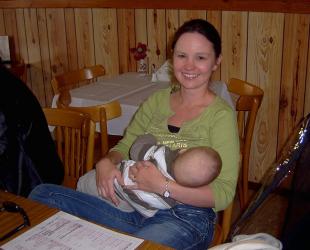A mother’s right to breastfeed her child is protected by law.

A mother’s right to breastfeed her child is protected by law both federally and in every State and Territory. It is illegal to treat a woman less favourably than another person in education, employment or access to buildings or services because she is breastfeeding.
For example:
-
A woman cannot be asked to leave a café for breastfeeding her baby.
-
A woman cannot be refused employment because she is breastfeeding.
-
A woman cannot be expelled from an educational institution because she is breastfeeding.
What is the law?
In Australian Federal Law breastfeeding is a right, not a privilege.
Under the federal Sex Discrimination Act 1984, it is illegal in Australia to discriminate against a person either directly or indirectly on the grounds of breastfeeding.
A useful publication from the Australian Human Rights Commission is Getting to Know the Sex Discrimination Act: A Guide for Young Women. While not directly mentioning breastfeeding, this publication does explain your rights and responsibilities under the Act.
The Law protects your right to breastfeed
As the former federal Sex Discrimination Commissioner, Pru Goward (2001–2006), stated: 'A mother's right to breastfeed is protected by the federal Sex Discrimination Act, which prohibits discrimination on the basis of sex, marital status, pregnancy and potential pregnancy. The Act also makes clear that discrimination because a woman is breastfeeding (or expressing) is regarded as sex discrimination because it is clearly a characteristic of women.'
Her predecessor, Susan Halliday (1998–2001), had earlier stated: 'Common sense dictates that hungry babies be fed and Australian parents have the right to choose the option of breastfeeding their children. For many years it has been illegal under federal, state and territory law to discriminate against breastfeeding women in the provision of goods and services, including service at restaurants, clubs, pubs and theatres and on public transport. It will be a particularly sad day when, in Australia, a woman is penalised for properly caring for her child in a public place.'
What about state and territory laws?
As well as the protection offered under the federal Sex Discrimination Act 1984, individual states and territories have their own laws to protect the rights of breastfeeding women. These cover areas such as work, education and the provision of goods and services. Details vary so check with your state or territory government agency.
Breastfeeding is a protected attribute. Discrimination on the basis of breastfeeding is illegal in the areas of: provision of goods and services, accommodation, financial services, employment, sport, education, access to premises, access to membership in a trade or professional organisation, membership of or services in a licensed club, business partnerships, requests for information and unlawful advertising.
Discrimination and harassment on the grounds of sex is illegal in the contexts of: opportunities in employment, state education, goods and services, accommodation and registered clubs. This includes breastfeeding as a characteristic specific to women.
Breastfeeding is a protected attribute. Discrimination on the basis of breastfeeding is explicitly illegal in all areas of public life.
It is illegal to discriminate against someone in the areas of accommodation, customer service and education because of their association with a child, which includes breastfeeding.
Breastfeeding is a protected attribute. Discrimination or 'prohibited conduct' is illegal on the basis of breastfeeding in the areas of: education, employment, provision of goods, facilities and services, clubs, state laws and programs, awards and industrial agreements. 'Prohibited conduct' is any conduct that offends, humiliates, intimidates, insults or ridicules a reasonable person on basis of a protected attribute.
Breastfeeding is a protected attribute. Discrimination on the basis of breastfeeding is illegal in the areas of: accommodation, clubs, education, employment, goods and services, selling and transferring land, and sport.
Discrimination on the ground of breastfeeding is prohibited in the contexts of: employment, education, access to places and vehicles, provision of goods, services and facilities, accommodation, disposal of land, clubs, application forms, advertisements, insurance (in some instances) and sport (in some instances).
Breastfeeding is a protected attribute. Discrimination or harassment on the basis of breastfeeding is illegal in the areas of education, work, accommodation, goods, services and facilities, clubs, insurance and superannuation. For protected attributes it is also illegal to fail to make reasonable accommodation for a person's special needs.
There is further general information about the various state laws from the Australian Human Rights Commission in A guide to Australia's anti-discrimination laws. More detailed information about breastfeeding and discrimination in each individual state and territory is found near the end of this article in the section Suggested Further Reading.


I have been discriminated against and want to take it further. What can I do?
If you or someone you know has been discriminated against on the grounds of breastfeeding, you can:
-
Take this as an opportunity to educate the person or organisation who you believe discriminated against you. Explain that their conduct is illegal and that such conduct is not only hurtful but can also be grounds for a complaint to your local anti-discrimination body.
-
Lodge a complaint with your local anti-discrimination body. This body can help the people involved try to work out a solution, which might involve an apology, a change in policy, staff training programs, refunds of fees and sometimes, compensation for hurt and humiliation suffered.
Where types of discrimination are covered by both state and federal laws, complaints may be lodged with either the state or federal agency, but not both. If you feel you have grounds for complaint, you can contact the Federal Commission for free advice on 1300 656 419 or online. You can also contact your state or territory agency before deciding who you will make your complaint with. This is especially important as there are differences between the state and federal jurisdictions.
Valid complaints are dealt with by conciliation. This is where the people involved in a complaint talk through the issues with the help of someone impartial and settle the matter on their own terms. It also helps the parties involved to better understand the issues and come up with solutions that are appropriate to their circumstances. This could be an apology, financial compensation, access to facilities previously denied, or something else that is agreed upon.
This information is as accurate as possible but is not intended to be relied on as legal advice.
© Australian Breastfeeding Association May 2022



